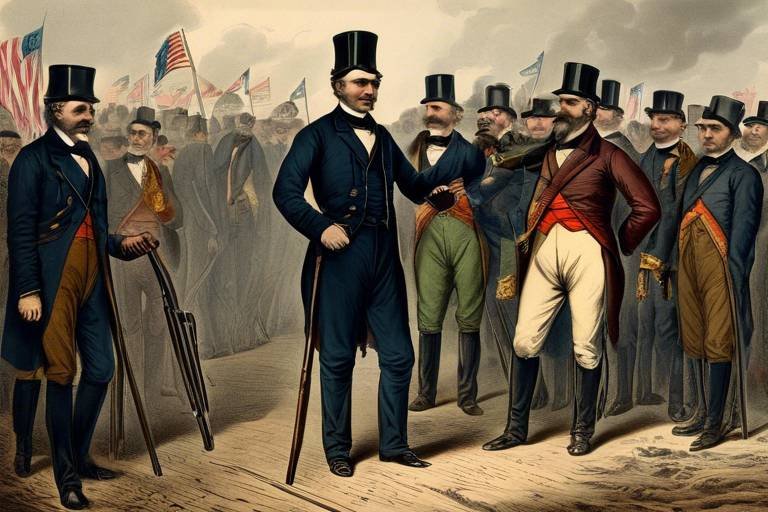The Historical Context of the Vietnam War
When delving into the historical context of the Vietnam War, it becomes evident that a multitude of events and factors converged to shape the course of this significant conflict and its lasting impact on not only the region but the entire world. The complexities and intricacies surrounding the Vietnam War are deeply rooted in a series of historical developments that set the stage for one of the most pivotal conflicts of the 20th century.
One of the fundamental pillars that laid the groundwork for the Vietnam War was the colonial legacy in Vietnam. The French colonization of Vietnam left a profound mark on the country's political landscape, creating a volatile environment that ultimately fueled tensions and resistance against foreign rule. The legacy of colonialism played a crucial role in shaping the trajectory of events that led to the outbreak of the Vietnam War.
Furthermore, the rise of Vietnamese nationalism emerged as a powerful force challenging foreign domination and asserting the country's independence. Various nationalist movements, spearheaded by influential figures such as Ho Chi Minh, played a pivotal role in galvanizing the Vietnamese people against external control and paving the way for a fierce struggle for self-determination.
Ho Chi Minh, a revered leader in Vietnamese history, rose to prominence as a key figure in the nationalist movement, with his leadership and vision inspiring the formation of the Viet Minh, a significant nationalist force that would play a central role in the resistance against foreign powers. The emergence of the Viet Minh marked a turning point in Vietnam's quest for sovereignty.
The Geneva Accords and the subsequent division of Vietnam into North and South following international agreements further exacerbated tensions and set the stage for a divided nation embroiled in conflict. The geopolitical maneuvering and power dynamics at play during this period significantly influenced the trajectory of the Vietnam War and its implications for the region.
Amidst the backdrop of the Cold War, the Vietnam War became a focal point of contention between the United States and the Soviet Union, with both superpowers vying for influence and control. The ideological struggle between capitalism and communism played out on the battlegrounds of Vietnam, shaping the course of the conflict and intensifying the stakes for all involved parties.
The escalation of U.S. involvement in Vietnam marked a significant turning point in the war, as American military presence increased substantially, leading to a protracted and bloody conflict with far-reaching consequences. The Tet Offensive, a pivotal moment in the war, not only shifted the dynamics on the ground but also had a profound impact on American public opinion and the burgeoning anti-war movement.

Colonial Legacy in Vietnam
The plays a crucial role in understanding the roots of the Vietnam War. The French colonization of Vietnam left a lasting impact on the country's political landscape, setting the stage for future conflicts. Vietnam's history of being under foreign rule shaped the nationalist sentiments that eventually led to the struggle for independence.
During the 19th century, France established its control over Vietnam, exploiting its resources and imposing its cultural influence. This colonization not only disrupted the traditional Vietnamese way of life but also sparked resistance movements among the local population. The French rule brought about economic exploitation and political oppression, fueling discontent and resistance among the Vietnamese people.
As the French colonial administration tightened its grip on Vietnam, nationalist movements began to gain momentum. Vietnamese intellectuals and leaders started advocating for independence and self-determination, challenging the legitimacy of foreign rule. The desire for autonomy and sovereignty became a unifying force among the Vietnamese population, transcending regional and ethnic differences.
One of the key figures in the fight against colonialism was Ho Chi Minh, a revolutionary leader who played a significant role in shaping Vietnamese nationalism. Ho Chi Minh's vision of a free and independent Vietnam resonated with many, inspiring them to join the struggle for liberation. Under his leadership, the Viet Minh was formed, a coalition of nationalist forces dedicated to fighting against foreign domination.
The legacy of French colonization in Vietnam not only fueled anti-colonial sentiment but also laid the groundwork for the nationalist movements that would eventually lead to the Vietnam War. The struggle for independence and the quest for self-determination were deeply rooted in the historical experiences of the Vietnamese people, shaping the course of their fight against foreign powers.

Rise of Vietnamese Nationalism
The was a pivotal moment in the country's history, marking a shift towards independence and self-determination. As Vietnam grappled with the legacy of French colonization, a strong sense of national identity began to take root among the Vietnamese people. This surge of nationalism was fueled by a desire to break free from foreign control and assert Vietnam's sovereignty.
At the heart of this movement was the emergence of charismatic leaders who galvanized the population with their calls for independence. Figures like Ho Chi Minh played a crucial role in mobilizing the Vietnamese people and uniting them in their struggle against colonial rule. The Vietnamese nationalist movements not only sought political autonomy but also aimed to preserve the country's cultural heritage and traditions.
One of the key aspects of Vietnamese nationalism was its emphasis on unity and solidarity among the various ethnic groups within the country. Despite facing internal divisions and external pressures, Vietnamese nationalists worked towards a common goal of liberation, drawing strength from their shared history and aspirations for a free and independent Vietnam.

Ho Chi Minh and the Viet Minh
Ho Chi Minh, a pivotal figure in the history of Vietnam, played a crucial role in the formation of the Viet Minh, a nationalist movement that would shape the course of the country's struggle for independence. Born as Nguyen Sinh Cung in 1890, Ho Chi Minh adopted his revolutionary pseudonym, which translates to "Bringer of Light," reflecting his vision for a liberated Vietnam. Inspired by the ideals of Marxism and Leninism, Ho Chi Minh led the Viet Minh in their fight against French colonial rule.
The Viet Minh, officially known as the League for the Independence of Vietnam, was established in 1941 with Ho Chi Minh at its helm. This coalition of nationalists, communists, and various anti-colonial forces aimed to unify the Vietnamese people in their quest for independence. Ho Chi Minh's leadership was characterized by his charisma, strategic acumen, and unwavering commitment to the cause of Vietnamese self-determination.
Under Ho Chi Minh's guidance, the Viet Minh waged a guerrilla war against the French colonial forces, employing tactics that emphasized mobility, surprise attacks, and the support of the local population. Ho Chi Minh's ability to mobilize popular support and maintain the resilience of his fighters against a better-equipped adversary was instrumental in the Viet Minh's success.
Ho Chi Minh's vision extended beyond mere military victory; he sought to build a unified and independent Vietnam free from foreign intervention. His dedication to this goal resonated with many Vietnamese who yearned for liberation from colonial oppression. The Viet Minh's efforts under his leadership laid the foundation for the broader struggle for Vietnamese independence and set the stage for the turbulent years that would follow.

Geneva Accords and Division of Vietnam
The Geneva Accords of 1954 marked a pivotal moment in the history of Vietnam, leading to the division of the country into North and South Vietnam. This division was a result of the negotiations among the major powers involved in the Indochina conflict, including France, the United States, the Soviet Union, and China. The agreement aimed to temporarily resolve the conflict and establish peace in the region.
Under the Geneva Accords, Vietnam was split at the 17th parallel, with the North controlled by the communist forces led by Ho Chi Minh, and the South governed by the anti-communist regime of Ngo Dinh Diem. The division was intended to be temporary, with national elections scheduled to reunify the country in 1956. However, these elections never took place due to the opposition of the United States and South Vietnam.
The Geneva Accords also outlined provisions for the withdrawal of French troops from Vietnam, effectively ending French colonial rule in the region. Additionally, the agreement established the demilitarized zone along the 17th parallel to prevent military activities between the two regions.
Despite the intentions of the Geneva Accords to bring peace to Vietnam, the division of the country ultimately fueled tensions and set the stage for the escalation of the Vietnam War. The ideological differences between the communist North and the anti-communist South, combined with external influences from the Cold War powers, deepened the political and military conflicts within Vietnam.
The legacy of the Geneva Accords and the division of Vietnam continues to shape the history and memory of the Vietnam War, highlighting the complexities of international diplomacy and the lasting impact of geopolitical decisions on a nation's fate.

Cold War Dynamics
Exploring the events and factors that led to the Vietnam War, shaping its course and impact on the region and the world.
Examining the French colonization of Vietnam and its effects on the country's political landscape leading up to the war.
Discussing the emergence of Vietnamese nationalist movements and their role in challenging foreign domination.
Exploring Ho Chi Minh's leadership and the formation of the Viet Minh as a key nationalist force.
Analyzing the international agreements that divided Vietnam into North and South, setting the stage for conflict.
Understanding how Cold War tensions between the U.S. and the Soviet Union influenced the Vietnam War.
Explaining the U.S. policy of containment and the fear of communism spreading in Southeast Asia.
Tracing the increasing American military presence in Vietnam and its impact on the conflict.
Examining the Tet Offensive's influence on American public perception of the war and the anti-war movement.

Domino Theory and Containment Policy
The Domino Theory was a key concept in U.S. foreign policy during the Cold War era. It posited that if one country in a region fell to communism, then neighboring countries would also follow suit like a row of falling dominos. This theory greatly influenced the U.S. containment policy, which aimed to prevent the spread of communism beyond its existing borders.
Imagine a game of dominoes where each piece represents a country in Southeast Asia. The fear was that if one piece, say Vietnam, turned communist, then Laos, Cambodia, and other countries would inevitably fall as well. This fear drove the U.S. to intervene in Vietnam to stop the perceived domino effect of communism spreading throughout the region.
The containment policy, spearheaded by the U.S., sought to contain the spread of communism by providing military and economic aid to countries at risk of falling under communist influence. This policy led to the U.S. involvement in conflicts such as the Vietnam War, as part of its broader strategy to prevent the expansion of communism.
Through the lens of the Domino Theory and containment policy, the Vietnam War can be seen as a battleground in the larger ideological struggle between the U.S. and the Soviet Union. The fear of communism spreading like dominos shaped U.S. decision-making and ultimately influenced the course and escalation of the war.

Escalation of U.S. Involvement
The escalation of U.S. involvement in the Vietnam War marked a significant turning point in the conflict, transforming it into a full-scale military intervention. As the Cold War tensions heightened, the United States increased its military presence in Vietnam to combat the spread of communism in Southeast Asia. This escalation was fueled by the Domino Theory, a belief that if one country fell to communism, neighboring countries would follow suit like a row of falling dominos.
With the implementation of the Containment Policy, the U.S. aimed to prevent the spread of communism by supporting the South Vietnamese government and military against the communist forces in the North. This policy led to a surge in American troops in Vietnam, with the number reaching over 500,000 by the late 1960s.
The U.S. involvement escalated further with the Tet Offensive in 1968, a series of coordinated attacks by the Viet Cong and North Vietnamese forces during the Vietnamese New Year. While the offensive was militarily unsuccessful for the communist forces, it had a profound impact on American public opinion and the anti-war movement.

Tet Offensive and Public Opinion
The Tet Offensive of 1968 was a pivotal moment in the Vietnam War that significantly impacted public opinion in the United States. This large-scale surprise attack by the North Vietnamese and Viet Cong forces on multiple cities and military targets in South Vietnam during the Tet holiday caught both the American military and the public off guard. The sheer scale and coordination of the offensive challenged the perception that the U.S. was winning the war, leading many Americans to question the government's narrative of progress in Vietnam.
The shocking images and reports of the Tet Offensive broadcasted into living rooms across America sparked a wave of anti-war sentiment and protests. The discrepancy between the optimistic official reports and the grim reality on the ground eroded trust in the government's handling of the war. The Tet Offensive served as a wake-up call, revealing the harsh realities of the conflict and prompting a reassessment of U.S. involvement in Vietnam.
Moreover, the Tet Offensive exposed the limitations of American military power and the resilience of the North Vietnamese forces. The inability of the U.S. and its allies to prevent such a large-scale attack despite their superior firepower raised doubts about the effectiveness of the military strategy pursued in Vietnam. As casualties mounted and the war dragged on, the Tet Offensive marked a turning point in public perception, fueling growing opposition to the war effort.
Frequently Asked Questions
- What were the main causes of the Vietnam War?
The Vietnam War was primarily fueled by the colonial legacy in Vietnam, the rise of Vietnamese nationalism, and the Cold War dynamics between the U.S. and the Soviet Union. The French colonization of Vietnam, the emergence of nationalist movements, and the fear of communism spreading in Southeast Asia were key factors that led to the conflict.
- Who was Ho Chi Minh and what was the role of the Viet Minh?
Ho Chi Minh was a key leader in the Vietnamese nationalist movement and played a crucial role in the formation of the Viet Minh, a nationalist force that fought against foreign domination. Ho Chi Minh's leadership and the Viet Minh's resistance efforts were instrumental in the struggle for Vietnamese independence.
- How did the division of Vietnam into North and South contribute to the conflict?
The division of Vietnam under the Geneva Accords created political instability and set the stage for the Vietnam War. The contrasting ideologies and governance in North and South Vietnam, coupled with external influences from the U.S. and the Soviet Union, intensified tensions and ultimately led to the outbreak of hostilities.
- What was the significance of the Tet Offensive?
The Tet Offensive was a major turning point in the Vietnam War, impacting public opinion and the anti-war movement in the U.S. The scale and intensity of the offensive challenged the perception of American military superiority and raised doubts about the U.S. government's handling of the conflict.



















